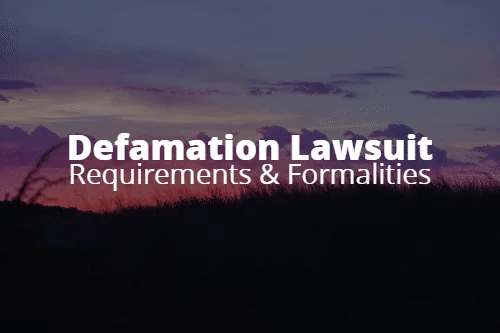
The Minc Law Guide to Indiana Defamation Law
This page has been peer-reviewed, fact-checked, and edited by qualified attorneys to ensure substantive accuracy and coverage.
What is Defamation? How Does Indiana Define Defamation?
Commonly referred to as “defamation of character,” defamation is an all-inclusive term governing the act of communicating, publishing, or otherwise making a false assertion of fact to a third-party, which ultimately harms or damages another person’s reputation. In the United States and other Common Law jurisdictions, such as the U.K. and Canada, defamation is classified as a civil wrong, allowing injured and defamed parties to recover damages for their injuries.
Defamation may also be referred to as the “tort of defamation,” and more specifically, it may be broken down into two fundamental types:
- Libel: a written or published (media, videos, pictures) false assertion of fact communicated to a third-party, ultimately damaging another person’s reputation.
- Slander: a spoken false assertion of fact communicated to a third-party, ultimately damaging another person’s reputation.
When describing the proper form in which the tort of defamation is committed, the general public typically confuses both libel and slander, most commonly opting to use “slander” as the overarching term for defamation. However, this can pose problems when bringing a defamation claim, as understanding the form in which the false assertion of fact or statement was conveyed is often crucial for procedural purposes. For example, certain states have differing statutes of limitations for libel and slander, and generally require defamation plaintiffs to bring slander actions earlier than libel actions.
Once again, when identifying the type of defamation committed, look to the form in which it was conveyed.
Here’s a little tip for remembering the form in which a statement was conveyed – if the statement is written… “Libel” is derived from the Latin word “libellus,” which means “booklet” or “small book,” so if you see a written statement, think of it as being published in a “libellus,” or a booklet.
Some other popular names for the tort of defamation include:
- Vilification,
- Character assassination,
- Calumny,
- Traducement, &
- Disparagement.
Keep in mind that disparagement, often referred to as “commercial” or “business disparagement” is actually a misnomer for defamation and specifically refers to derogatory statements made about a business or title to property. Disparagement exists to protect business property and financial rights, not an individual’s reputation.
To read up further on business and commercial disparagement, check out our detailed blog post titled, “What is Business/Commercial Disparagement?” Our comprehensive posts addresses the distinctions between disparagement and defamation, the elements necessary for a successful disparagement claim, food libel laws, the most common defenses to disparagement actions, and how to hold disparaging parties liable for their actions.
For reference, parties who defame another are commonly referred to as:
- Defamers: the general and overarching term for persons who communicate false assertions of fact to a third-party.
- Slanderers: parties who verbally communicate defamatory statements.
- Libelers: parties who publish written defamatory statements.
- Famacide: persons who “destroy another’s reputation.”
Now, let’s take a look at how Indiana defamation law defines defamation and the necessary elements for a successful defamation claim.
Indiana defamation law defines defamation as “a statement that ‘tends so to harm the reputation of another as to lower him in the estimation of the community or to deter third persons from associating or dealing with him.’” Journal-Gazette Co. v. Bandido’s, Inc., 712 N.E.2d 446, 451 (Ind. 1999) (quoting Doe v. Methodist Hospital, 690 N.E.2d 681, 686 (Ind. 1997).
In a subsequent Indiana case, defamation was similarly stated as “that which tends to injure or to diminish esteem, respect, goodwill, or confidence in the plaintiff, or to excite derogatory feelings or opinions about the plaintiff.” Ratcliff v. Barnes, 750 N.E.2d 433, 436 (Ind. App. 2001), Haegert v. McMullan, 953 N.E.2d 1223, 1230 (Ind. App. 2011) (quoting McQueen v. Fayette Cnty. Sch. Corp., 711 N.E.2d 62, 65 (Ind. App. 1999).
If you’d like to see how Indiana’s definition of defamation stacks up to other states’ definitions, check out our other comprehensive blog posts on state defamation law:
- California Defamation Law,
- Illinois Defamation Law,
- Texas Defamation Law,
- New York Defamation Law,
- Utah Defamation Law,
- Ohio Defamation Law, &
- Florida Defamation Law.
In order for an Indiana defamation plaintiff to succeed in their libel or slander claim, they are required to prove the following four (4) elements:
Indiana’s Defamation Elements
Indiana libel and slander plaintiffs must prove and present facts showing the defendant:
- Communicated a statement with defamatory imputation,
- With malice or negligence,
- The statement was published, &
- Caused damages.
In this blog post and outline, we will address all four (4) core elements of Indiana defamation claims.
Defamation Law Tip: If you’d like to suppress negative online search results, there’s several free and easy steps you can take: (1) Make your social media profiles public, (2) Comment openly on other public accounts, (3) Interlink between various social media accounts (this creates a robust online corpus of positive content), and (4) Start your own blog and update frequently. Google rewards positive content.
If you’re a resident of Indiana or any other U.S. state and have been the victim of defamation or other malicious and false accusations and attacks, reach out to the internet defamation attorneys of Minc Law today!
The Minc Law team of defamation removal attorneys know what it takes to secure swift and permanent online defamation removals. Having taken on over 1300 clients in the last six years, Minc Law defamation lawyers know who to work with and how to work with them, and have worked with countless website administrators, content managers, and third-party arbitration firms.
When dealing with defamation, every situation is unique, so it’s of the utmost importance you consult an experienced internet defamation removal law firm when pressed with online defamation or other slanderous attacks.
To schedule your free, initial no-obligation consultation with an intake specialist, call us at (216) 373-7706, or schedule a meeting online by filling out our online contact form.
At Minc Law, we’re here to fight for your reputation.
Let’s take a look at Indiana’s defamation pleading standard and tackle exactly what pleadings are and the reason behind them.
Indiana Defamation Law Pleading Standard
Before addressing Indiana’s defamation law pleading standard, it’s essential to understand what pleadings are and why they exist. If you’ve ever watched Law and Order or any other legal TV drama, you’ve likely heard the following terms used.
First, pleadings are specific formal documents which are filed with the court, outlining and stating a party’s fundamental claims and positions. Pleadings are initiated by the plaintiff – after all, there would be no claim without an injured plaintiff. Below are four of the most commonly used documents used in pre-trial pleadings:
- Complaint: the initial document served by the plaintiff, outlining their positions, claims, facts of the incident, and relief sought.
- Answer: the defendant’s answer to the plaintiff’s complaint – addressing the plaintiff’s allegations and either refuting them or raising certain defenses.
- Reply: the subsequent responses by either the plaintiff or defendant, addressing new or additional claims and points raised by the other.
- Counterclaim: an opposing and separate claim raised by the defendant in order to offset certain claims.
It’s important to keep in mind that pleadings can vary significantly by state and area of law, therefore it’s very important to acquaint yourself with your state’s specific pleading requirements and guidelines. Contacting an experienced internet defamation attorney is highly recommended in order to better understand your legal options and how to efficiently and effectively bring a libel or slander claim.
For example, one state may require a defamation plaintiff to file their claim within a shorter amount of time, while another state may have more relaxed filing deadlines. Additionally, specific areas of law could mandate a plaintiff plead and prove their case with specificity or particularity in order to lower the likelihood of frivolous claims and give a defendant proper notice of the charge against them.
Indiana Code § 34-15-1-1 states, “in an action for libel or slander, it is sufficient to state generally that the defamatory matter published or spoken was about the plaintiff.”
However, plaintiffs must include the defamatory statement in their complaint, so that courts are able to determine the claim’s legitimacy. For example, an Indiana court reversed a trial court’s denial of summary judgment because no specific defamatory statement was plead by the plaintiff in their complaint. Trail v. Boys & Girls Clubs, 845 N.E.2d 130, 136-138 (Ind. 2006), see also Town of W. Terre Haute v. Roach, 2016 Ind. App. LEXIS 53 (Ind. Ct. App. 2016).
Supporting this is a 2012 Indiana case, Sharkey v. Cochran, which determined a plaintiff’s vague allegations were insufficient to state a legally-cognizable claim for defamation, as the plaintiff failed:
- To provide the date of the allegedly defamatory statements,
- The general contents of the statements, &
- How the plaintiff was damaged by the statements.
Defamation Per Se: What Types of Statements Does Indiana Consider ‘Per Se’?
Also referred to as ‘libel per se,’ or ‘slander per se’, defamation per se is the legal principle that some statements are just so inherently damaging and defamatory that a plaintiff need not actually prove damages.
Indiana defamation law considers the following four types of statements to be defamation per se:
- Statements imputing criminal conduct on the plaintiff,
- Statements imputing a loathsome disease on the plaintiff,
- Statements imputing misconduct in a person’s trade, profession, office, or occupation, &
- Statements imputing sexual misconduct.
In order to maintain an action for defamation per se in Indiana, a plaintiff must first assert that the statement(s) in question is false.
Indiana affirms a common approach to damages and presumed damages in cases of defamation per se.
Defamation per se is generally associated with presumed damages, as after all, the plaintiff is not required to prove they suffered actual damage or injury. We’ll tackle presumed damages and other common defamation damages in Section 5.
To gain a better understanding of what Indiana defamation law considers to be defamation per se, let’s take a look at five (5) cases.
5 Indiana Defamation Law Per Se Cases
- Fraud: In State Farm Fire & Cas. Co. v. Radcliff, 987 N.E.2d 121 (Ind. Ct. App. 2013), the defendant insurance company sent allegations to law enforcement agencies alleging the plaintiff had committed fraud. Ultimately, the court affirmed the jury verdict’s finding that there was defamation per se because the insurance company either knew the statements about the plaintiff were false or made with reckless disregard of their veracity.
- Girl Scout meeting inebriation: In Cortez v. Jo-Ann Stores, Inc., 827 N.E.2d 1223, 1231 (Ind. Ct. App. 2005), an Indiana court held that a statement made via e-mail that the plaintiff was “drunk” at her daughters Girl Scout meeting was defamatory per se because it implied criminal behavior in the form of child neglect and public intoxication. The names of her alleged crimes were not stated in the actual email, however, the use of the term “drunk” alone was enough to implicate the crimes. Id.
- Judicial misconduct: A court recognized that a letter in the newspaper alleging judicial misconduct was defamatory per se, but not in the instant case because the statements were actually true.
- “Sticky fingers”: An Indiana court found defamation and potential abuse of a qualified privilege defense after a defendant told a plaintiff’s employer that the plaintiff had “sticky fingers,” without any knowledge or good-faith belief that the plaintiff ever stole money.
- Liars & favoritism: Calling someone a “liar” and stating that a principal “favored some staff” was not considered defamatory per se, however a jury could have concluded the comments were defamatory per quod.
In case number five (5) “Liars & favoritism,” we mentioned the legal doctrine of defamation per quod, let’s take a further look.
Defamation Per Quod
On the other side of the defamation spectrum is the legal principle of defamation per quod, which requires plaintiffs bringing a defamation claim to prove the allegedly defamatory statement were actually defamatory via supporting evidence.
Opposite to defamation per se, damages are not presumed in defamation per quod cases and the most common form of damages associated with per quod cases are called “special damages.”
Keep in mind that if a plaintiff is unable to support their libel or slander claim with sufficient evidence, then their claim likely won’t succeed – unless the allegedly defamatory statements fall into one of the above four (4) per se categories.
Defamation Removal Tip: If you’d like to take a proactive approach to your online reputation, we highly recommend you create a Google Alerts account. Doing so will allow you to monitor anytime your name is mentioned online, or in conjunction with specific words. Just remember, online defamation is like a fire, the longer you let it sit and embed itself into the Internet’s archives, the harder it is to put out.
Important Indiana Defamation Law Requirements & Formalities

When bringing a libel or slander action in Indiana and any other U.S. state, plaintiffs will be required to abide by certain formalities, otherwise their claim may be dismissed or thrown out. In this section, we’re going to address Indiana courts and their jurisdictional reach over out-of-state defendants, the proper venue for bringing a defamation action, Indiana’s defamation statute of limitations, and much more.
Do Indiana Courts Have Jurisdiction Over Out-of-State Defamation Defendants?
Simply put, Indiana courts will have jurisdiction over out-of-state defamation defendants in certain types of cases.
Ind. Trial Rule 4.4(A) is Indiana’s equivalent of a “long-arm statute” and reads, “In a defamation action, the place of the tort is generally considered the place of publication i.e., where the defamatory material is communicated to a third party.”
In Marty v. Hess, the defendant sent faxes and mail to the plaintiff’s place of employment, and such materials were ultimately published in Indiana, so jurisdiction over the defendant was proper.
Additionally, 4.4(A) reads, “Any person or organization that is a nonresident of this state, a resident of this state who has left the state, or a person whose residence is unknown, submits to the jurisdiction of the courts of this state as to any action arising from the following acts committed by him or her or his or her agent…:
(2) causing personal injury or property damage by an act or omission done within this state;
(3) causing personal injury or property damage in this state by an occurrence, act or omission done outside this state if he regularly does or solicits business or engages in any other persistent course of conduct, or derives substantial revenue or benefit from goods, materials, or services used, consumed, or rendered in this state.”
Finally, the end of Section 4.4(A) reads, “In addition, a court of this state may exercise jurisdiction on any basis not inconsistent with the Constitutions of this state or the United States,” leaving the door open for further potential grounds for jurisdiction.
Online Defamation Law Fact: The United States is typically considered a pro-defendant defamation jurisdiction due to its long upholding of the First Amendment and free speech, while European and other Commonwealth countries (United Kingdom, Canada, Australia) are generally considered pro-plaintiff.
Now that we’ve taken a look at whether Indiana courts have jurisdiction over out-of-state defendants, let’s see where exactly a plaintiff may commence their defamation suit.
In Which Venue Can Indiana Defamation Plaintiffs Sue a Defendant?
In an Indiana libel or slander action, courts generally consider the place of the tort to be where the place of publication occurred – i.e. where the defamatory material was communicated to a third party.
Below are several core venue requirements set forth in Indiana’s Rule of Trial Procedure.
Indiana’s preferred venue will lie in:
- Greatest percentage of defendants: “the county where the greater percentage of individual defendants included in the complaint resides, or, if there is no such greater percentage, the place where any individual defendant so named resides;” Rule 75(A)(1);
- Principal office of organization: “the county where either the principal office of a defendant organization is located or the office or agency of a defendant organization or individual to which the claim relates or out of which the claim arose is located…” Rule 75(A)(5);
- Plaintiffs & nonresidents: “the county where either one or more individual plaintiffs reside, the principal office of any plaintiff organization or governmental organization is located, or the office of any such plaintiff organization or governmental organization to which the claim relates or out of which the claim arose is located, if the case is not subject to the requirements of subsections (1) through (9) of this subdivision or if all the defendants are nonresident individuals or nonresident organizations without a principal office in the state.” Rule 75(A)(10).
However, in the 2014 case of Belcher v. Kroczek, the court ultimately transferred the defamation and invasion of privacy action to the defendant’s county of residence.
Does Indiana Have a Statute of Limitations For Bringing Libel & Slander Claims?
First off, for those unfamiliar with what a statute of limitations is – it’s a law outlining and prescribing the length of time a plaintiff has to initiate and bring a legal action after suffering harm or injury.
Video: What is the Statute of Limitations for Defamation in the U.S.?

Statutes of limitations exist for several core reasons:
- Efficiency: Having a statute of limitations in place requires plaintiffs who have suffered injury or harm to bring an action with reasonable diligence and within a timely manner.
- Evidence: Requiring a claim be brought within a reasonable time allows defendants to preserve or prevent the accidental destruction of key evidence.
- Justice: Ultimately, statute of limitations are aimed at preventing more “cruelty than justice.”
Should a plaintiff fail to bring their claim with the outlined timeframe set forth in the statute of limitations, they will likely have their case dismissed or be prevented from even filing their claim – unless there are certain extenuating circumstances.
Indiana boasts a two (2) year statute of limitations for defamation claims. Ind. Code § 34-11-2-4.
More specifically, Indiana’s statute of limitations for all tort claims “begins to run when the plaintiff knew or, in the exercise of ordinary diligence, could have discovered that an injury had been sustained as a result of the tortious act of another.” In this case, it would be the tort of defamation.
For example, in the 1992 case of Wehling v. Citizens Nat’l Bank, a plaintiff was not barred by the two year statute of limitations because the claim was filed within two years of the plaintiff finding out about the defamation. Wehling v. Citizens Nat’l Bank, 586 N.E.2d 840 (Ind. 1992), see also Burks v. Rushmore, 534 N.E.2d 1101, 1105 (Ind. 1989).
There is however one important statutory exception to Indiana’s statute of limitations, which provides that every repetition or republication of a defamatory statement is a publication itself and a new and distinct libel.
This takes us to a common legal principle referred to as the ‘Single Publication Rule’.
Single Publication Rule
The single publication rule is a widely recognized and accepted legal principle governing the accrual dates for a defamation plaintiff’s cause of action. The single publication rule shakes the very core of statute of limitations laws, as it limits a defamation plaintiffs recovery to that for one mass publication or dissemination of an allegedly defamatory statement(s) and prohibits multiple defamation actions for subsequent copies or publishings of a defamatory statement(s).
But, what’s the reason behind the single publication rule?
Efficiency.
The United States already boasts a bloated judicial system, plagued by frivolous suits and mass incarceration. Therefore, the single publication rule looks to eliminate unnecessary cases for the same wrong or injury.
In order to operate similar to a well-oiled machine, our judicial system needs mechanisms in place to cut out the fat – and in this case, the fat refers to defamation actions arising out of the same publication, which may ultimately be resolved and rectified in one case.
Indiana does not have any reported cases where they ruled on the single publication rule.
Defamation Removal Tip: Statutes of limitations can vary by state, so it’s important you familiarize yourself with your state’s specific defamation statutes or consult an experienced defamation attorney. Don’t miss out on recovery due to misreading the prescribed time frame.
Indiana’s Statute of Limitations vs. Other U.S. States’
In the realm of defamation law, most U.S. states have a one to two year statute of limitations period for bringing a libel or slander claim. As mentioned above, it’s extremely important to familiarize yourself with your respective state’s statute of limitations period, otherwise you may be barred from bring a claim.
Below is a chart showing several other states and their statute of limitations time frame.
| Ohio | One (1) year |
| California | One (1) year |
| Illinois | One (1) year |
| Texas | One (1) year |
| Florida | Two (2) years |
| South Carolina | Two (2) years |
| New Hampshire | Three (3) years |
| Massachusetts | Three (3) years |
If you’d like to read up on all fifty states and their statutes of limitations, check out our Complete Guide to U.S. Online Defamation Law.
If you’re a resident of Indiana or any other U.S. state, and have been the victim of online defamation or slander, the defamation removal attorneys of Minc Law want to fight for you and your reputation. At Minc Law, we have a nearly 100% online defamation removal rate, and all for a flat, reasonable fee.
The Minc Law team of defamation lawyers have litigated in over 19 states and 3 countries, securing hundreds of takedowns and removals. Minc Law knows how to get results.
Reach out today to schedule your free, initial no-obligation consultation with an intake specialist by calling us at (216) 373-7706, or schedule a meeting online by filling out our online contact form.
Public v. Private Persons: Which One Am I?
When dealing with defamation of character claims, a person’s status or notoriety in the community may ultimately affect their rights of recovery or action. Simply put, if you’re a celebrity – think Justin Bieber, politicians, and other figures of notoriety – their legal rights will likely differ from yours – those of a private citizen.
This section will address the various rights afforded to both public and private persons under Indiana defamation law, how they differ, and which type of defamation plaintiff you are. And, depending on any time you may or have not have enjoyed – or currently enjoy – in the limelight, you might be surprised to find out which category you fall into.
So, why is it important to differentiate between private and public plaintiffs in defamation law?
The 1964 landmark defamation case of New York Times Co. v. Sullivan laid the modern framework for differentiating between public and private plaintiffs in defamation law. Ultimately, the U.S. Supreme Court ruled in favor of differentiating between the two in order to further “uninhibited debate of public issues,” and set forth two separate burdens of proof for each plaintiff to meet in order to succeed in their claim.
- Public Plaintiffs: We generally think of public plaintiffs as celebrities, however they can also be politicians, notable figures in the community, and other persons who have voluntarily availed themselves to the public light. As such parties have availed themselves to the public – and thus a higher degree of scrutiny and criticism – public plaintiffs have a stricter burden of proof when proving defamation. After all, in order to truly further uninhibited debate of public and other contentious issues, the general public should feel safe when discussing those issues. Public plaintiffs are required to prove a defendant acted with actual malice when communicating or publishing an allegedly defamatory statement. Keep in mind that actual malice includes statements which were made with knowledge of their falsity or with reckless disregard.
- Private Plaintiffs: If you’re reading this and have never enjoyed an extended stay in the limelight or aren’t directly influencing political, social, legal, or economic policy in the U.S., then you likely will be classified as a private plaintiff. Private plaintiffs and persons have not availed themselves to heightened public criticism or scrutiny, and thus are only required to prove a defendant acted with ordinary negligence when communicating or publishing an allegedly defamatory statement.
When ruling on a defamation claim, Indiana defamation law actually chooses to focus on whether the matter at hand is of general or public concern, irrespective of whether the defamed plaintiff was a public or private individual.
Indiana does however recognize four types of defamation plaintiffs, which we will go into greater detail below:
- Private persons,
- Public officials,
- General-purpose public figures, &
- Limited-purpose public figures
| Indiana's Four Classifications of Defamation Plaintiffs | Private Persons | Public Officials | General-Purpose Public Figures | Limited-Purpose Public Figures (LPPFs) |
|---|---|---|---|---|
| Definition | Parties who are not described in any of the following three categories and who have not thrust or availed themselves to public scrutiny or comment. | Indiana defines public officials are persons “who have, or appear to the public to have, substantial responsibility for or control over the conduct of governmental affairs.” Beeching v. Levee, 764 N.E.2d 669 (Ind. Ct. App. 2002). | Recognized under the U.S. Supreme Court ruling in Gertz, general-purpose figures are typically persons who have such pervasive power and influence in that they invite criticism or comment on both public and private matters. | Also recognized under the Gertz ruling, limited-purpose public figures are persons who have thrust themselves to “the forefront of particular controversies in order to influence the resolution of the issues involved.” Gertz, 418 U.S. at 345. |
| Burden of proof | Negligence | Actual Malice | Actual Malice | Actual Malice |
| Example | School principals are not public officials or public figures. Beeching v. Levee, 764 N.E.2d 669 (Ind. Ct. App. 2002). | (1) An announced candidate for county prosecutor was considered a public official. Shine v. Loomis, 836 N.E.2d 952 (Ind. Ct. App. 2005). (2) Judges are considered public officials in Indiana. Heeb v. Smith, 613 N.E.2d 416 (Ind. Ct. App. 1993). (3) A sheriff and deputy were deemed to be public officials. Conwell v. Beatty, 667 N.E.2d 768, 774 (Ind. Ct. App. 1996). (4) An owner of a repair company was ruled to be a public figure because he had actively advertised his services in a county and talked publicly about the insurance company plaintiff. State Farm Fire & Cas, Co. v. Radcliff, 987 N.E.2d 121 (Ind. Ct. App. 2013). (5) Restaurants and other establishments that actively advertise and seek commercial patronage have been held to be public figures, at least for the limited purpose of consumer reporting on their goods and services. Journal-Gazette Co. v. Bandido’s, 712 N.E.2d 446 (Ind. 1999). | General-purpose public figures are typically celebrities, politicians, and other persons who have availed themselves to comment and criticism on all matters private and public. | A party who temporarily thrusts themselves into the limelight, such as a person advocating for legal reform in one instance. |
Defamation of Character Fact: If you’re seeing the term ‘cyber defamation’ thrown around, know that it’s simply defamation or slander broadcasted via digital media, and typically through the Internet.
As mentioned above, when tackling defamation actions in Indiana, Indiana courts opt to focus on whether the issue at hand is one of public or general concern. Below, we’ll tackle the various rules and burdens surrounding issues of private and public concern, and why differentiating between the two matters for your case.
Issues of Public & Private Concern
Just as public figures and officials have stricter burdens of proof to meet when bringing a defamation claim, statements of public and general concern enjoy greater protection from defamation liability.
But why?
It all circles back to furthering uninhibited debate and the promotion of an informed society. Without such protection mechanisms and burdens in place, think of the numerous persons and organizations who would not comment or speak openly about hot topic or informative issues. Keep in mind that legal, social, economic, and political policy as we know it would ultimately cease to exist and slowly wither away.
To expand on the burdens further, we can look to the ruling set forth by the U.S. Supreme Court in Rosenbloom v. Metromedia. The court opined that in cases of private persons versus media defendants, involving matters of public or general concern, defamation plaintiffs will be required to prove the defendant in question published or communicated the statement(s) with actual malice.
Indiana classifies speech of public concern as speech which “relates ‘to any political, social, or other concern to the community.’”
Additionally, in certain situations – and depending on the nature of the allegedly defamatory statement – plaintiffs may be required to prove a defendant acted with more than just mere negligence in order to recover defamation damages.
To better understand what exactly constitutes an issue of general or public concern, let’s take a look at seven (7) Indiana case examples where courts ruled on the differences.
- Professional misconduct: Allegations of professional misconduct by a psychologist was determined to be an issue of public concern and per se defamation.
- Late sewage bills: An Indiana court ruled the matter to be a public controversy when a newspaper published a story about an attorney who received the names of town citizens who were delinquent on their sewage bills and that the attorney had informed the citizens that their privacy rights were violated.
- Health code: Health code violations at a restaurant were ruled to be a matter of public concern.
- Student disappearance: A newspaper’s website reporting which linked the plaintiff with another student who had disappeared was determined to be a matter of public concern in Indiana.
- Serious health issues: An allegedly defamatory article that appeared in a national journal and dealt with a serious health issue was deemed to be an issue of general and public concern.
- Arrests: An Indiana court ruled the arrest of leadership (persons) of local drug and education efforts was an issue of public interest.
- Elementary school dispute: A dispute at an elementary school between a principal and some teachers was not considered a matter of public interest because there was no evidence that anyone outside of the school was aware of the tension and there was no indication that the students at the elementary school were affected by the incidents.
Online Defamation Tip: If you’ve found defamatory or malicious online material attacking your reputation, it’s important to preserve any evidence you can – doing so will ultimately strengthen your claim. Make sure to take a screenshot(s) of the offending material, and have a third-party (such as a friend or family member), take corroborating screenshots. Having a third-party help document evidence will reduce the likelihood you’ll be accused of having tampered with the text or photo.
Common Defenses to Defamation in Indiana
Even though a party may have communicated or published a defamatory statement(s), they may still be authorized by law to have communicated it by relying on one of the below defenses.
Below is a list of some of the most common defenses to defamation in Indiana and the rest of the United States:
- Opinion,
- Truth/Falsity, &
- Privilege (Absolute, Qualified, Fair Report, Statutory).
First, let’s tackle possible the most common defense to a defamation of character claim and one that is recognized in almost every state – the defense of opinion.
Opinion
When determining whether an allegedly defamatory statement is one of opinion, the ultimate decision is left in the hands of the Indiana courts.
“It is a question of law for the court to decide whether a statement considered in its entirety is capable of possessing a defamatory meaning or implication.” Journal-Gazette Co. v. Bandido’s, Inc., 712 N.E.2d 446, 457, citing Woods v. Evansville Press Co., 791 F.2d 480, 486 (7th Cir. 1986).
Indiana courts choose to employ a specific test when determining whether a statement is defamatory or opinion.
“For a statement to be actionable, it must be clear that it contains objectively verifiable fact regarding the plaintiff.” Meyer v. Beta Tau House Corp., 31 N.E.3d 501, 515 (Ind. Ct. App. 2015); citing Hamilton v. Prewett, 860 N.E.2d 1234 (Ind. Ct. App. 2007). We will address the defense of truth/veracity in the subsequent section.
“If the speaker is merely expressing his subjective view, interpretation, or theory, then the statement is not actionable.” That’s right, subjective statements will not susceptible to a defamation action, unless such statements are susceptible to both defamatory and non-defamatory meanings – then, the matter of interpretation should be left to the trier of fact.
Just because a party disguises statements of fact as ones of opinion, it does not immunize them from defamation liability. “[A]n idea or opinion that conveys a defamatory imputation of fact, even if couched in humor, can be actionable.” Furthermore, an Indiana court opined that couching a statement as an opinion does not dispel implications of factual statements.
So, when approaching opinion, keep the above three types of statements in mind:
- Subjective,
- Interpretative, &
- Theoretical.
All three of the above types of statements will cause a court to lean towards opinion when approaching allegedly defamatory statements.
Ultimately, the test for Indiana courts weighing whether a statement is defamatory or not is determining whether the facts of the statement may be proven true or false – more specifically, “whether a reasonable fact finder could conclude that the statement implies facts which may be proven true or false.”
Let’s take a look at three (3) examples to help us better understand whether a statement constitutes opinion or fact.
3 Indiana Opinion Case Examples
- Fraternity troubles: An email sent to the plaintiff, which was carbon copied to other fraternity members, was ultimately found to be beyond just an opinion because it implied that the plaintiff was seeking a vendetta against another member and that the plaintiff disregarded his fraternity.
- Attorney battles: An Indiana court found statements published by a newspaper reporting one attorney called another attorney a liar to be opinion. The statement was ultimately “rhetorical hyperbole” by an opposing attorney and could not actually be proven true or false by the newspaper.
- Basketball scout: A statement that a basketball scout had “destroyed and undermined the girls’ program” was ruled to be more than opinion, because it contained factual assertions.
Continuing on the path of truth and fact, let’s turn to the defense of truth/falsity.
Truth/Falsity
As mentioned above and throughout this comprehensive state guide, the tort of defamation is fundamentally based on whether or not a false assertion of fact has been communicated or published. Therefore, it shouldn’t be any surprise that the defense of truth/falsity is a complete an absolute defense to defamation of character claims. As Gandhi said, “Truth never damages a cause that’s just.” Yes, the truth hurts, but that doesn’t mean it should be censored altogether.
Indiana courts affirmed the idea that defamatory statements must contain falsity in the 2006 case of Trail v. Boys & Girls Clubs, where they cited the 1997 case of Doe v. Methodist Hospital, “Any statement actionable for defamation must not only be defamatory in nature, but false.” Trail v. Boys & Girls Clubs, 845 N.E.2d 130, 136 (Ind. 2006) citing Doe v. Methodist Hospital, 690 N.E.2d 681, 687 (Ind. 1997).
In Indiana, truth will be a complete defense to a charge of libel or slander.
For reference, below are two examples where the Indiana courts ruled on whether statements were true or false, and thus actionable or not.
- Golf cheating: An Indiana court found that truth was a defense to a defamation charge in a case where a golfer was labeled a cheater, as the golfer did in fact actually cheat, and therefore any statements saying he was a “cheater” were true and not actionable.”
- Property perp: Although an allegation that a plaintiff had taken county property may have been true, the defendant’s truth defense failed because their defamatory statement characterized the individual as a “perpetrator” who stole county property, which was untrue.
The last example is a textbook case of a defendant who conflated truth with a false assertion of fact – in this case, labeling the plaintiff as a “perpetrator.”
Some states recognize the legal doctrine of ‘Substantial Truth,” which holds that a statement may not be actionable for libel or slander if the statement is true, even if it possesses slight inaccuracies. As long as the crux of the statement is true, then substantial truth will apply.
Oftentimes, when dealing with substantial truth, the “gist” or “sting” of the statement must be true.
Privilege
Privilege is a common legal term which seems overwhelming at first, but in reality is actually quite a simple and straightforward legal concept. Privilege simply refers to a person’s legal right, entitlement, or enjoyment to publish or communicate a statement in a certain situation – regardless of whether it’s defamatory or not. And, with most overarching legal terms, there are varying degrees of protection under privilege.
And, as we’ve learned from the above sections, the law is geared towards easing our institutional decision making processes and freedoms. Privilege is no different, and exists to promote free debate and discussion of contentious topics, without having to worry about legal repercussion or sanctions.
Without the legal doctrine of privilege, our entire societal framework would fail to be as robust or comprehensive as it is now, and potentially erode or avail innocent persons to unanticipated technicalities.
When dealing with privilege, Indiana breaks privilege down into four core types:
- Absolute,
- Qualified,
- Fair Report, &
- Statutory.
For the most part, the below four privileges can be seen as being presented in order from most thorough and encompassing to most narrow and least comprehensive.
Absolute
Think of absolute privilege as the ultimate top dog of privileges, as it is the unequivocal and unqualified right granted to person to make a certain type of statement at a certain time – even if it’s defamatory. Absolute privilege is all-encompassing and even applies to persons who published or communicated a statement with actual malice – or reckless disregard.
Most commonly, absolute privilege will apply in our governmental institutions, in furtherance of legal, social, economic, and political policy. More specifically, it’s usually granted in judicial, administrative, and other official proceedings. Think of a legislator who needs to communicate certain statements to his colleagues in furtherance of creating more narrowly defined and protective laws.
Indiana extends absolute privileges to speakers in:
- Juridical proceedings: Absolute privilege will protect persons who make all relevant statements in the court of a juridical proceeding, regardless of the truth or motive behind the statements. It will also extend to statements in court filings, if they are relevant to the litigation at hand.
- University anti-harassment policy: Students making complaints pursuant to a university anti-harassment policy will enjoy absolute privilege in Indiana.
- Consent: In the state of Indiana, consent is an absolute privilege to a defamation charge. Think about it, you can’t consent to a defamatory statement being published about you, and then later go back on it.
Qualified
Qualified privilege is a less comprehensive form of privilege, as it attaches in fewer situations, and may be overcome if a party communicates or publishes a statement with actual malice. Typically referred to as ‘Common Interest Privilege,” qualified privilege is a person’s legal right, entitlement, or joy, to publish or communicate a statement in a specific situation or set of circumstances.
Parties enjoying qualified privilege will commonly be persons in positions of trust and authority, who have a legal, social, or moral duty to publish or communicate certain statements. Additionally, privilege will usually only attach when the audience the person is communicating the statement to has a reciprocal interest in hearing or reading the statement.
Indiana will apply qualified privilege in cases where a party is issuing or communicating a statement(s) which is a matter of public or general concern. Additionally, the statements will not receive protection under Indiana law if they are made with actual malice.
More specifically, the common interest privilege in Indiana “applies to communications made in good faith on any subject matter in which the party making the communication has an interest or in reference to which he has a duty, either public or private, either legal, moral, or social, if made to a person having a corresponding interest or duty.”
Below are three nuanced situations where common interest privilege will apply in Indiana.
Furthermore, “The common interest privilege protects communications “made in connection with membership qualifications … employment references … and the extension of credit.”
To reiterate in a more manageable form, qualified privilege will apply in the following situations:
- Membership qualifications,
- Employment references, &
- Extension of credit.
So, how do parties lose qualified privilege in Indiana?
Parties can lose qualified privilege in Indiana if it’s shown that:
- Ill will: “the communicator was primarily motivated by ill will in making the statement;
- Excessive publication: there was excessive publication of the defamatory statements; or
- No grounds for truth: the statement was made without belief or grounds for belief in its truth.”
Let’s turn to two case examples where Indiana courts ruled on the matter of qualified privilege.
- Public interest privilege (common interest privilege) was recognized in State Farm Fire & Cas. Co. v. Radcliff for crime reporting.
- Common interest privilege protected a letter sent from a school to students’ parents about a teacher’s termination, as privilege protects the free flow of information about school faculty members.
Fair Report
Fair report privilege is a privilege granted to persons and organizations who rely on official, legislative, administrative, and legislative proceedings and reports and publish information contained within them. As our news media is often reporting on the latest and greatest reports put forth by the government, it would be conflicting and an egregious misstep to punish those who rely in good faith on governmental reports.
After all, our government has an imperative interest in promoting trust in their decision making processes, regulations, and laws, therefore those who do trust them shouldn’t be punished.
In Indiana, fair report privilege is limited to opinions on public officials and their conduct.
Statutory
States will often codify certain privileges into their laws, cutting out any confusion or ambiguity as to whether a party is or is not protected in a certain situation.
Below are just a few situations where Indiana has codified privilege.
- Unemployment compensation: Statements made to the Indiana Employment Security Division relating to claims of unemployment will be protected under qualified privilege.
- Mental health service providers: Ind. Code § 34-30-16-1 extends privilege to communications made to mental health service providers.
- Hospital peer review committee: Ind. Code § 34-30-15-1 provides that all communications made to a hospital peer review committee are privileged.
- Intent to defraud: Ind. Code § 27-2-19-6 provides immunity to law enforcement agencies, insurers, and government agencies to speak with other law enforcement agencies, insurers, and government agencies if there is a good faith belief that the claimant has an intent to defraud.
- Enforcement duties: Absolute privilege will exist under Indiana Tort claims Act, Ind. Codes §§ 34-13-3-1 through 34-13-3-25. Under the Indiana Tort Claims Act, a government agency was entitled to absolute immunity from a defamation lawsuit because it was engaged in enforcement duties.
If you’re still unsure about the legal concept of privilege and are the victim of defamation or other malicious online attacks, we strongly recommend you reach out to an experienced internet defamation attorney today.
At Minc Law, we know who to work with and how to work with them in order to secure swift and permanent online defamation removals. Most notable, we boast a nearly 100% removal rate, and all for a flat, reasonable fee.
Call us today to schedule your free, initial no-obligation consultation with an intake specialist at (216) 373-7706, or fill out our contact form online.
Indiana Privilege Comparison Chart
| Type | Absolute | Qualified | Fair Report | Statutory |
|---|---|---|---|---|
| Definition | The unequivocal and unqualified right to publish or communicate a specific statement - regardless of its contents. | The qualified right to make a specific statement in specific circumstances, typically granted to persons in positions of trust and authority who have a social, legal, or moral duty to make it known. | The legal right for persons and organizations to publish information from official, administrative, judicial, and legislative reports and proceedings without fear of legal repercussion. | Specific legal rights and situations codified into state laws, immunizing parties for their communications of certain statements. |
| Can it be defeated? | No - even if the publication or statement is made with actual malice. | Yes - if the publication or statement is made with actual malice. | Yes - if the statement or publication is made with actual malice. | N/A |
| Examples | (1) All relevant statements made in the court of a juridical proceeding. (2) Statements made in court filings if relevant to litigation. (3) Complaints made by current students pursuant to university anti-harassment policies. (4) Consent. | (1) Matters of public or general concern. (2) Situations where a person has a public or private duty to make such statement. (3) Statements made in connection with membership qualifications, employment references, and extension of credit. (4) Crime reporting. (5) Information about school faculty members. | Statements of opinion on public officials and their conduct. | (1) Statements made to the Indiana Employment Security Division relating to unemployment compensation claims. (2) Communications made to mental health service providers. (3) Statements and communications to hospital peer review committees. (4) Communications between law enforcement agencies, insurers, and government agencies to speak with each other about a claimant’s intent to defraud. (5) The Indiana Tort Claims Act, specifically in cases where a government agency engages in enforcement duties. |
Defamation Law Fact: Some other less popular defenses to a libel or slander claim include: (1) statements made with reasonable belief that they were true, (2) innocent dissemination, (3) where a plaintiff is incapable of suffering further damage to their reputation, (4) no actual injury to the plaintiff, and (5) no actual third-party communication.
Indiana Defamation Damages
As outlined in Section 1, the fourth element required to successfully prove defamation in Indiana is “damages.” Plaintiffs are generally reimbursed for their injury and harm suffered in the form of a monetary sum. However, sometimes plaintiffs may also recover non-economic damages, such as in the case where a defendant acted egregiously or maliciously, or caused damage to a person’s quality of life.
Defamation damages can typically be divided into four (4) traditional types:
- Presumed Damages,
- Special Damages,
- Actual Damages, &
- Punitive Damages.
Presumed Damages
Presumed damages are as its name implies…presumed and are often associated with the legal doctrine of defamation per se, as the plaintiff is NOT required to prove they suffered any particular or special type of injury or harm. Think back to defamation per se, which labels certain statements as so inherently defamatory that the plaintiff need not actually prove they suffered damage.
Indiana associates presumed damages with defamation per se, and the 1992 case of Henrichs v. Pivarnik affirmed such, stating, “If a communication is defamatory per se, damages will be presumed.”
Special Damages
Opposite to presumed damages and the legal principle of defamation per se are special damages, which are typically associated with defamation per quod actions – as they require a plaintiff to provide supporting evidence showing the allegedly defamatory statements in question are actually defamatory.
Also known as “special harm,” special damages are sought when there is a specific or unique injury suffered by the plaintiff. Because the injury or harm is so unique, plaintiffs must prove it with extrinsic evidence. Indiana has affirmed the need for plaintiffs in an action for defamation per quod to prove and demonstrate special damages.
If an Indiana defamation plaintiff is not the subject of a defamatory per se statement(s), then “special damages must be alleged in the complaint.” Gibson v. Kincaid, 140 Ind. App. 186 (Ind. Ct. App. 1966).
In Indiana, “A plaintiff pleading special damages due to defamation, whether per quod or per se, must plead and demonstrate that the special damages were, ‘incurred as a natural and proximate consequence of the wrongful act.’” Northern Ind. Pub. Serv. Co v. Dabagia, 721 N.E.2d 294 (Ind. Ct. App. 1999) quoting Stanley v. Kelley, 422 N.E.2d 663, 668-669 (Ind. Ct. App. 1981), rejected in part on other grounds by Bochnowski v. Peoples Federal Sav. & Loan Ass’n, 571 N.E.2d 282, 284 (Ind. 1991).
Unlike presumed damages, “Special damages are not assumed to be necessary or inevitable but must be shown by allegation and specific proof to have been actually incurred as a natural and proximate consequence of the wrongful act.” Stanley v. Kelley, 422 N.E.2d 663, 668-69 (Ind. Ct. App. 1981) rejected on other grounds by Bochnowski v. Peoples Federal Sav. & Loan Ass’n, 571 N.E.2d at 284.
Indiana courts further opined, “A plaintiff in a per quod defamation action can recover for emotional and physical harm only upon a showing of special damages.” They expanded, “Emotional and physical harms are not special damages unto themselves, but rather are parasitic damages, viable only when attached to normal (i.e. pecuniary) special damages.” Id.
Below are two examples where Indiana courts ruled on several types of special damages:
- Lost earnings: A roofing company was awarded special damages for a variety of claims, including one for defamation which contributed to lost earnings.
- Lower raise: A jury reasonably inferred that a principal who received a lower raise than from previous years due to defamatory comments about her was entitled to special damages.
Keep in mind that the above two examples are non-exhaustive list of special damages, and are just two examples of what Indiana has ruled to be “special damage.”
Actual Damages
Also known as “compensatory damages,” actual damages are awards issued to plaintiffs who have experienced tangible or real harm, injury, or loss due to libelous or slanderous statements.
Indiana’s actual damages are divided between general damages and special damages.
More specifically, general damages are those that the law presumed to be the:
- Natural,
- Proximate, &
- Necessary result of the publication.
This included injury to the plaintiff’s:
- Reputation,
- Standing in the community,
- Personal humiliation, &
- Mental anguish & suffering.
In cases of actual damages against radio broadcasters, television broadcasters, and newspapers for defamation, they will include all damages in respect to the plaintiff’s character, property, business, trade, profession, or occupation.
Lost Business
In 1976, an Indiana plaintiff was awarded – by jury – $150,000 in actual damages due to lost business after the defendant accused the plaintiff of embezzling company funds.
Punitive Damages
Punitive damages are neither economic nor non-economic damages due to the fact that they are not awarded as reimbursement to a defamed plaintiff and are awarded in order to punish a defendant who acted maliciously or in a wanton manner.
Punitive damages may be more aptly named “punishment damages” or “exemplary damages” due to their intent to punish a defendant, rather than compensate for actual loss suffered by the plaintiff.
To recover punitive damages in Indiana, “there must be clear and convincing evidence which overcomes the presumption that the defendant’s conduct was merely negligent or the result of some honest error.”. Ind. Code § 34-4-34-2 specifically requires clear and convincing evidence to support a claim for punitive damages.
Punitive damages are particularly appropriate in cases where the wrongdoer – defamer – occupied a position of trust.
Punitive damages may be awarded in the absence of compensatory damages where the statement(s) in question are defamatory per se. Henrichs v. Pivarnik, 588 N.E.2d 537 (Ind. Ct. App. 1992); but see Street v. Shoe Carnival, Inc., 660 N.E.2d 1054 (Ind. Ct. App. 1996). Note that compensatory damages are however a prerequisite to recovery of punitive damages.
For handy reference, below is a comparison chart outlining the core differences between all four types of defamation damages in Indiana.
Indiana Defamation Damages Comparison Chart
| Presumed Damages | Special Damages | Actual Damages | Punitive Damages | |
|---|---|---|---|---|
| Definition | Damages which a plaintiff is not required to prove, as the allegedly libelous or slanderous statements are considered so inherently defamatory (defamation per se), that damage is presumed. | Damages unique to a special situation or harm suffered by the plaintiff, and typically associated with defamation per quod due to the need to provide supporting evidence of the statement(s) defamatory nature. | Damages issued for tangible and real injury, harm, or loss suffered by the plaintiff. | Damages granted to a plaintiff in order to punish a defendant for especially malicious or wanton behavior. |
| How to Prove | Plaintiffs are not required to prove they suffered damage due to the severity and inherently defamatory nature of the statements. | Plaintiffs seeking special damages must demonstrate the special damages were incurred as a natural and proximate consequence of a wrongful act. They are not presumed. | Plaintiffs may prove injury to their reputation, standing in the community, personal humiliation, and mental anguish and suffering. Or in the case of radio and television broadcasters and newspapers, plaintiffs may prove damage to their character, property, business, trade, profession, or occupation. | Plaintiffs must prove by clear and convincing evidence that the defendant’s conduct exceeded that of mere negligence or an honest error. |
Online Reputation & Management Tip: Curious about how to ensure your online personal profile or business’s profile is fully optimized? (1) Create a website with your name or business as the domain (or try to acquire an existing domain that is in your name), (2) Start a blog and get into a routine of consistently putting out good content, (3) Up your LinkedIn game by actively commenting or filling out your profile, (4) Start making YouTube videos (Google’s search results especially love quality videos for SEO purposes), (5) Build backlinks to your website through guest posting or quality content.
Can I Retract a Defamatory Statement?
You might be wondering, what happens if a party or organization makes a defamatory statement, but then retract it. Will they still be liable?
In Indiana, when concerning radio broadcasters, television broadcasters, newspapers, and news service publications, plaintiffs must serve a notice to them before filing suit.
Ind. Code § 34-15-3-2 provides the following requirements for radio and television broadcasters:
At least three (3) days before filing a complaint in a suit described in section 1 [IC 34-15-3-1] of this chapter, the aggrieved party shall serve notice:
- In writing;
- On the manager of the radio or television station;
- At the principal office of the radio or television station; &
- That specifies the words or acts that the aggrieved party alleges to be false and defamatory.
Ind. Code 34-15-4-2 addresses the requirements for newspaper publishers:
(a) Before bringing a suit described in section 1 [IC 34-15-4-1] of this chapter, the aggrieved party shall:
- At least four (4) days before filing the complaint against a news service;
- At least six (6) days before filing the complaint against a daily newspaper; or
- At least eleven (11) days before filing the complaint against a weekly newspaper; serve notice in writing specifying the factual statements in the article that are alleged to be false and defamatory, and correcting the falsity of the statements by reference to the true facts.
(b) If the publication of the alleged libel was by a newspaper, the notice shall be served on the publisher at the newspaper’s principal office of publication. If the transmission of the alleged libel was by a news service, the notice shall be served on the bureau chief at the news service’s principal Indiana office.
So, what types of damages can a plaintiff recover?
Ind. Code § 34-15-3-3 states that only actual damages may be recovered from broadcasters if there has been a retraction.
Similarly, for newspapers under Ind. Code § 34-15-4-3, if the retraction occurred within three days by a news service, within five days if the newspaper is a daily publication, or within ten days if the newspaper is a weekly publication after the mistake was brought to the knowledge of the publisher or bureau chief, a plaintiff may only recover actual damages.
Actual malice will not be established in the action if the only basis for the malice allegation is because the newspaper did not retract a statement.
Defamation Law Fact: Group libel exists in the United States, and has been held on numerous occasions to be a crime punishable under common law. Simply put, defamation law is not an area of law that must only be restricted to an individual, and may be extended to a family or class of persons.
Frequently Asked Questions
Q. Does Indiana have any criminal defamation laws?
A. No. Indiana does not have any criminal libel or slander statutes.
To learn about the current 25 states and one U.S. territory which have codified criminal defamation in some form or another, check out this guide.
Q. Does Indiana have any protections for anonymous speech?
A. The Indiana Shield law was ruled not to protect anonymous commenters to newspaper websites because the Shield Law is intended to protect news sources, not people who comment after an article has been posted.
Indiana adopted a modified version of the Dendrite test in Ind. Newspapers Inc. v. Junior Achievement of Cent. Ind., requiring plaintiffs to produce “prima facie evidence to support only those elements of their cause of action that are not dependent on the commenter’s identity.” Ind. Newspapers Inc. v. Junior Achievement of Cent. Ind., 963 N.E.2d 534, 552 (Ind. Ct. App. 2012) (modified Dendrite like that in Mobilisa v. Doe, 217 Ariz. 103, 170 P.3d 712, 720 (Ariz. Ct. App. 2007)).
Q. Can I bring a slander or libel lawsuit against a person who is out-of-state?
A. Yes, but only in specific circumstances. To read up further on whether you can bring a defamation lawsuit against an out-of-state defendant please see Section 2.
Indiana considers the place of the tort as the place of defamatory publication – where it’s communicated to a third party. In the 1998 case of Mart v. Hess, a defendant sent mail and faxes to the plaintiff’s place of employment, resulting in their publication in Indiana. Ultimately, the court ruled that Indiana did have jurisdiction over the out-of-state defendant due to its publication there.
Q. What are SLAPP Lawsuits? Does Indiana have any Anti-SLAPP legislation?
A. Strategic lawsuits against public participation (SLAPP) are lawsuits brought by parties looking to intimidate, censor, silence, or burden an opposing party, with the ultimate goal of causing a person to abandon their lawsuit or criticism. SLAPP suits are highly frowned upon and seen as unethical, due to their coercive and often frivolous nature.
Helping safeguard individuals who are threatened with a SLAPP suit are Anti-SLAPP laws, which typically impose penalties on parties who file frivolous suits.
Ind. Code § 34-7-7-1 to 34-7-7-10 applies to speech made in connection with a public issue or an issue of public interest. For example, Ind. Code § 34-7-7-1 provides that in order to qualify for protection under the statute, persons must have made the statement in question “in good faith and with a reasonable basis in law and fact.”
It’s important to note that Indiana’s Anti-SLAPP statute does not supplant (replace) the common law of defamation, but simply requires production of proof that the speech was lawful.
In Hamilton, v. Prewett, 860 N.E.2d 1234, 137 (Ind. Ct. App. 2007), an Indiana court did not award attorney’s fees under the Anti-SLAPP statute because the subject of the parody was not a matter of public interest – which is to be protected under the Anti-SLAPP statute.
Q. What is Prior Restraint? Does Indiana recognize the legal doctrine of Prior Restraint?
A. Prior restraint is the official restriction of speech before it is actually published, and has been described by the U.S. Supreme Court as, “the most serious and least tolerable infringement on First Amendment rights.”
In Indiana, prior restraint describes administrative and judicial orders which expressly forbid certain communications when issued in advance of the time that such communications are to occur.
For example, an Indiana court ruled that an injunction ordering property owners to remove a sign and refrain from putting up any sign referring to a contractor was an unconstitutional prior restraint on speech.
Prior restraint was also not allowed when an insurance adjuster made slanderous comments imputing misconduct and criminal conduct by an auto-body business.
If there is prior restraint in Indiana, there is a heavy presumption that said prior restraint is invalid.
And, it’s not only publications that prior restraint applies to, it also applies to republications. Prior restraint is not permissible for either a publication or republication of a statement of public interest.
Q. What is the Relation Back Doctrine?
A. The Relation Back Doctrine is the legal principle that an act done today will be treated as if it were completed earlier, and typically applies in pleadings.
For example, in Federal Civil Procedure, an amended pleading may relate back to the date of the original pleading was filed for the determination of statutes of limitations time frames if:
- “The law that provides the applicable statute of limitations allows relation back;
- The amendment asserts a claim or defense that arose out of the conduct, transaction, or occurrence set out – or attempted to be set out – in the original pleading; or
- The amendment changes the party of the naming of the party against whom a claim is asserted…within the period provided by Rule 4(m)…”
In Indiana, a complaint where the plaintiff had filed against a “John Doe’ defendant did not relate back to the original filing date when the actual defendant was named in the complaint beyond the two-year statute of limitations, because the identity of the defendant was not unknown to the plaintiff.

Work with the Defamation Removal Attorneys of Minc Law Today!
If you are an Indiana resident, or any other U.S. state, and have been a victim of defamation, the defamation lawyers of Minc Law want to work with you in order to restore your reputation. At Minc Law, we boast a nearly 100% removal rate. We’ve litigated over 300 cases, in 26 states and 5 countries, and have secured over 50,000 removals. At Minc Law, we know who to work with and how to work with them.
Here’s what you can expect when working with Minc Law:
- Courtesy & Respect: We understand how invasive online defamation can be, and approach every client with the utmost respect and courtesy. Keep in mind that when working with our team, your goals are our goals.
- Open Communication & Dialogue: Some lawyers go radio silent after the removal process has begun. At Minc Law, we’ll stay in constant contact with you regarding the details of your case or removal.
- Results: We’ve worked tirelessly with countless website administrators, content managers, and third-party arbitration firms to secure hundreds of removals. Businesses and websites answer to Minc Law.
When it comes to suing for defamation, costs are a number one concern for our clients. While there is no one-size-fits-all answer for determining a defamation lawsuit’s total costs, there are several major factors that may impact the required budget to sue for libel or slander. If you are considering the option of filing a defamation lawsuit to stop libelous attacks to your reputation, we recommend checking out the video below to learn the stages of a defamation lawsuit and the unique factors that can affect costs.
Video: How Much Does a Defamation Lawsuit Cost? Cost to Sue For Defamation

If you are the target of defamatory attacks, we can help hold the perpetrators accountable. We fight for our clients using both litigation (lawsuits) and non-litigation alternative methods. Contact us today to schedule your free, initial no-obligation consultation with an intake specialist by calling us at (216) 373-7706, or by filling out our contact form online.
At Minc Law, we want to fight for your reputation
★★★★★
“Minc was easy to contact and replied to my questions quickly and kept me up to date on my status. Communications was a bonus. Success with the outcome was icing on the cake.”
Daren G., Apr 14, 2020





















